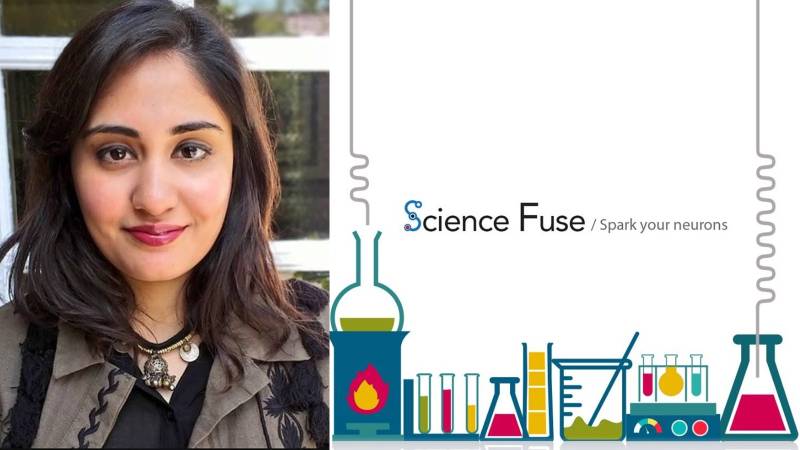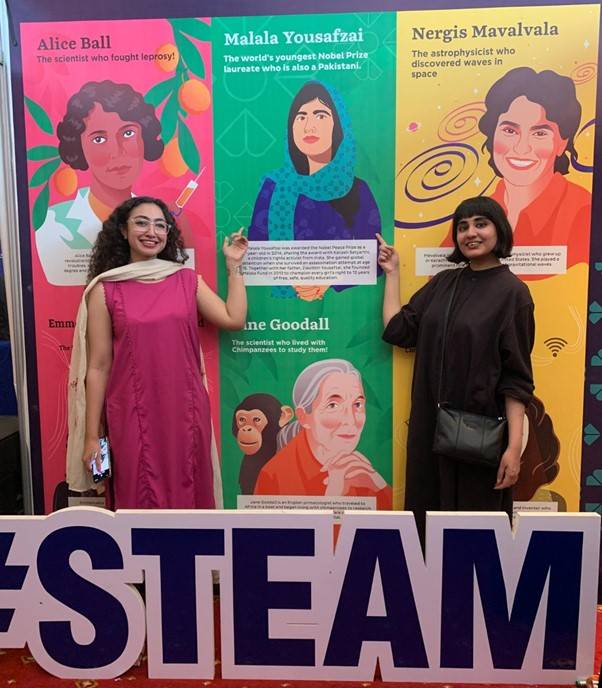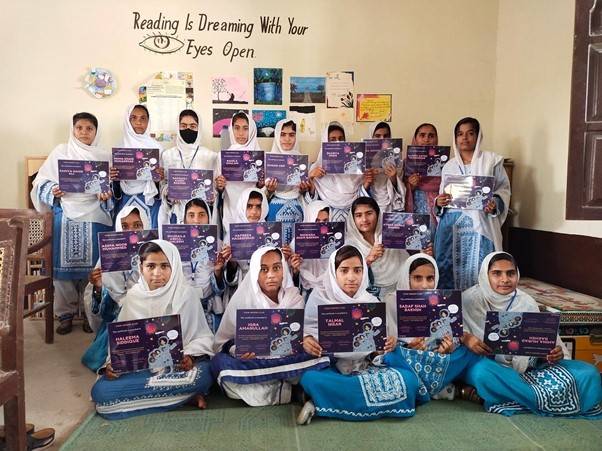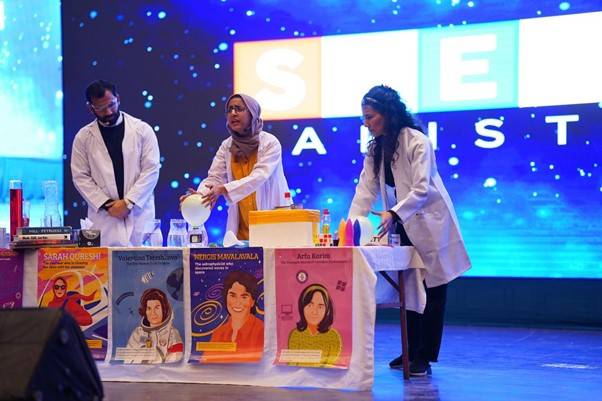
"Science is not a subject, it is a perspective, a perspective that helps you question. And our society never wants you to question things… or question authority.”
Lalarukh Fazl-ur-Rehman is the CEO and founder of Science Fuse, an independent non-profit organization that is working to improve science literacy and empower Pakistan’s younger generations through interactive learning. Her decorated career includes working as an Acumen fellow, and being selected as one of the 11 Malala Fund Education Champions from Pakistan.
Lalarukh’s journey to such esteemed success has not been without some of the challenges and unfortunate barriers that women in our society inevitably have to surmount.
“I had a very strange upbringing because when I was in my 20s, a lot of the people around me who were my age got to experience a lot. They would meet different people, explore relationships, different skills and hobbies. I wasn't allowed to do all that. I came from a really conservative family. So when I was coming out of my 20s, I felt like my parents had robbed me of these experiences. There was a lot of bitterness and anger, but also a lot of motivation to catch up. I felt so far behind all the others.”
For her, Science Fuse presented the spark of opportunity she needed. She started the company 6 years ago with a “small Ikea bag that I had brought from Norway when I was shifting back to Lahore, and some help from my mom.”
The organisation has now expanded to a team of 200 science communicators, has conducted programs to train about 700 teachers in Pakistan, and has an outreach that has influenced about 50,000 students.

Imama & Lalarukh pose in front of Science Fuse's poster series called 'Remarkable Women in STEM' that features women from all around the globe, including Pakistan, and women of colour who've done amazing things in STEM but are not too well known.
For her, the company provided a sense of social achievement that was undeniably unique and significant. But along with that, it acted as an avenue to help her rebuild her relationship with science, one that was left significantly severed during her university years.
“I chose Biotechnology as my major in university. But that degree was no easy work. I was constantly bombarded with comments regarding how useless my degree was simply because it wasn't medicine. My parents made me feel so bad about it. It is unfortunate that the benchmark for success and respect in our society involves studying medicine. I felt like I had let my parents down. Apart from that, my university experience at the Norwegian University of Life Sciences, being surrounded by locals who knew the country, the culture and the language better than me made me feel like the odd one out. We had moved to Norway when I was 18 and I felt really lost when I was there. I really struggled during that time period. I couldn't finish my Bachelors degree in time and went into depression.”
Her relation with science is just one of the examples of how women have a different experience and relationship with science. Something she calls “science capital,” the core philosophy behind Science Fuse’s objectives.
Science capital is a research based approach to understanding how science and society interact. Research shows that people from specific demographics feel elevated confidence in their abilities to choose STEM careers, causing a lack of progression in the scientific community in academia for a more diverse, inclusive group of people. Science capital explains the reason behind it. It claims that a person’s professional inclination towards science depends on factors like how much they know, their science related experiences, media consumption, family’s attitude and how many people they know from science related roles - factors that are inextricably linked to ethnicity, social class and gender.
Lalarukh explains this with the following metaphor: “Science capital is almost like a bag. Almost like capital accumulated in a bank account, and it basically amalgamates your science related attitudes, values and experiences. I stumbled across this term during my time at ‘The Science Museum in London’. They were researching on how specific communities suffer with having different levels of science capital, all with the objective of improving diversity in science. Science is an indispensable tool that is crucial to solving issues like climate change, pollution, and the demographics with high science capital are the only ones that can solve their own problems. So if a girl or a person of colour doesn't have the confidence to engage with science and pursue it, they can’t solve their personal issues. So the objective is really social justice.”
“Every woman opens her eyes into an unequal world and sadly the onus is placed on the women to bridge this gap”
While Science Fuse had helped her interact with science in a far more flexible manner, building an organisation from the ground up was no easy task.
“There was so much I didn't know. When I started doing this, I was not confident and had very little self esteem. I would have to give seminars in English, a language I was hardly proficient in because I hadn't used it that commonly during my life. Most times I felt like I didn't have enough to offer to the crowd.”
Despite Science Fuse’s renown and affiliation with international institutions and donors like Malala Fund, the insecurities Lalarukh has worked so hard to leave behind in the past still find ways to seep into her thoughts.
“I sometimes still feel like I should get a 9 to 5.”

These girls are from a school located in Pishukan, Balochistan. Science Fuse trained their teachers, who then ran an 8-week STEM club with them. The girls received these certificates from Science Fuse once the program ended.
What then keeps her motivated to move forward with this endeavour?
“It’s just the feeling that you're building something of your own. We have a core team of 6 people now, and all 6 of them are independent people with a salary that we pay. They have dreams, goals, aspirations - all of which Science Fuse has helped them work towards. It was so shocking to see the impact of Science Fuse on my team. The way they grew and developed was something that happened unconsciously.”
Despite all the statistics and numbers she could have thrown at us, for Lalarukh, her experience and journey has been indelibly augmented with names and stories of amazing women she has met along the way. Her face lit up as she mentioned the names of Arooj Khalid and Imama Owaisi, women she has worked with who have grown and developed into distinguished social activists, following the same pipeline as Lalarukh - becoming an Acumen fellow and joining Malala Fund.
Arooj Khalid has been an Acumen Fellow, a fellow with Malala Fund for the last two years, and served as a Senior Associate with The Citizens Foundation. She is currently studying at Harvard with a Fullbright scholarship. Imama Owaisi is currently an Acumen Fellow and a Senior Project Officer for STEAM, a collaboration between Science Fuse and the Pakistan Alliance for Maths and Science (PAMS.)
“Imama called me today to tell me about her first seminar with Acumen. To see her growth from a junior communicator at Science Fuse right out of Forman Christian College to now a full blown Acumen fellow has been such an inspiring experience. When you're working, you always need to remember the why. Why you started doing this. For me, it was to bring about change, and Imama and Arooj are such tangible outcomes of how Science Fuse has changed people’s lives.”
Lalarukh and her colleagues’ tales are a hopeful reminder of how far self-belief can take you. The solidarity that her organisation has fostered has not just supported the women who make up the organisation, but have pushed them forward into making a larger impact in Pakistani society.

The 3 STEAM educators, Maria Qibtiah (right), Mahnoor Abdullah (middle) & Qumnber Abidi (left).
Lalarukh’s work in Pakistan has emphasised the debilitating issues that plague the national education system. The system has succumbed to orthodox testing systems, tedious and outdated curriculums, and untrained and underpaid teachers.
“We worked with about 10 Government schools in Pakistan for STEAM, a project that was done in collaboration with the Federal Ministry of Education. What we realised was that even the FDE supervisors didn't really care about the intellectual development of students. Their main concern was to just monitor how fast the syllabus was being covered, and they would pressurise the teachers to rush through the concepts.”
Such intricate problems run deep through our national education system. Science Fuse and other educational social enterprises are working to fix these issues from the ground up, conducting work on the ground to ensure that students have the ability to improve their science capital and become more confident in their ability to pursue careers in STEM.

